Charities Supporting Those Affected by War
Posted: 13 Apr 2022At any time of crisis there’ll be no shortage or people and organisations asking for your help – but where should you look to find out how or where to best to lend support?
Whether it’s the conflicts in Israel and Palestine or Ukraine, Covid-19, climate change or any other disaster or emergency response scenario requiring swift and ongoing humanitarian aid, there are a wealth of charities and organisations ready and willing to head straight for the frontlines or wherever their help will be most valuable. As individuals, we may all want to play our part in supporting those efforts, or simply following their continued work to help keep track of the evolving situation.
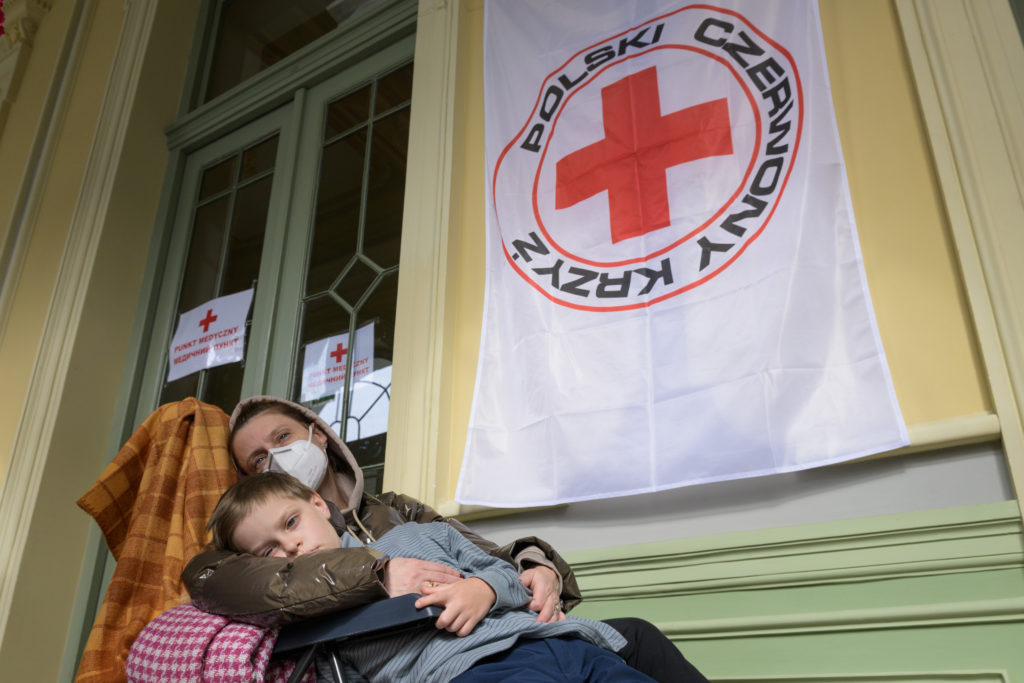
Photo by Anthony Upton/DEC: Yulia and her son Danilo 10, sit in Przemysl train station in Poland, on 3 March 2022. They have travelled for two days from Kyiv and will be staying with friends in Poland. The Polish Red Cross are supporting people at this station. Courtesy of DEC.
However, with a lot of names and organisations being actively promoted, it can be hard to know where you should be focusing your attention. Social media obviously broadens the scope beyond the likes of TV and newspaper appeals and so it can feel like an impossible task to choose one over another – and, of course, it does also open up the potential for those with less honourable intentions seeking to profit from the tragedy.
Certainly those operating on a global scale, such the Red Cross and Save the Children, will have a largely recognisable profile that you may well be familiar with. However, you may also find regional or local charities that seem to be doing great work but without the same resources for to get their message across – so how can you tell who to support… or who to trust?

Photo by Maksym Trebukhov/International Committee of the Red Cross: Ukraine Crisis Appeal – URCS staff and volunteers help people sheltering in subway station. Courtesy of DEC.
Similar to how you might want to verify your news sources, there are a few things you can do to make sure your money is going to a good cause. Firstly, check their online presence. A clear and detailed website should be a given (charities commonly use a .org domain name, but it’s not a requirement), and it should also provide contact details including an office address (that you can check is real via Google Maps) and a contact phone number (that’s not a mobile!).
You can also look it up through the Charity Commission for England and Wales, with similar sites for Scotland and Northern Ireland, but bear in mind that some smaller charities may not be registered, while other non-profit organisations working under different rules may not be either.
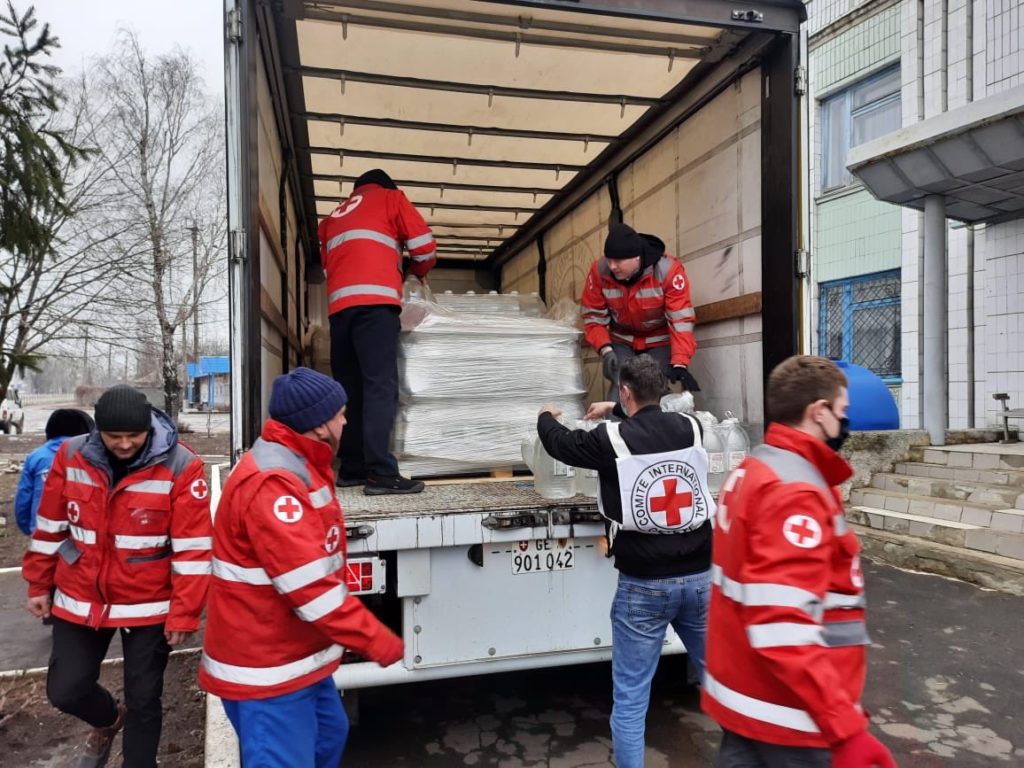
Photo by Polish Red Cross: ICRC teams deliver 16,200 litres of potable water to Olenovka village in Donbas on February 25. Courtesy of DEC.
For added peace of mind, you can also check for references to the charity from other related websites or search for proven examples of its charitable work, such as blog posts or news stories from a trusted source. Some fake sites may copy and paste content from creditable sources so they look active, but they should be easy to spot with frequently inconsistent or out-of-place references. If you’re in any doubt at all, then it’s probably best avoided, and you can instead look at some of the more recognised names, such as…
The Disasters Emergency Committee
Launched in 1963 the DEC currently brings together 15 leading UK aid charities in a combined effort to raise funds quickly and efficiently at times of crisis. By pooling their resources, the DEC and its members can provide an essential part of the UK’s response to any ongoing crisis. It also houses a Rapid Response Network made up of national media outlets and corporate partners to help raise the alarm and spread the message during times of need.
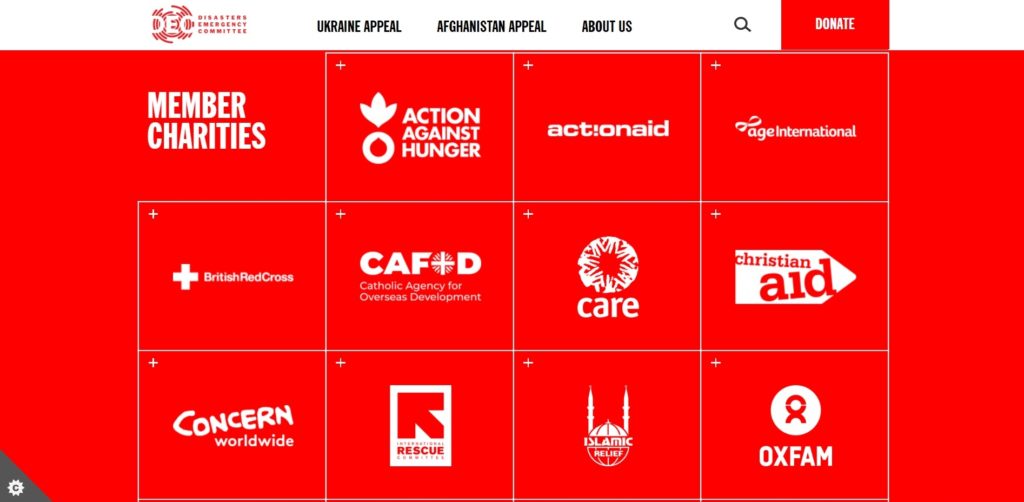
You may well have seen its name and website (www.dec.org.uk) listed on many charitable appeals, and you can be sure that any donations made through it will be redirected to where it’s needed the most. Alternatively, you might want to support one of its members directly, to help target your support in an area that matters the most to you.
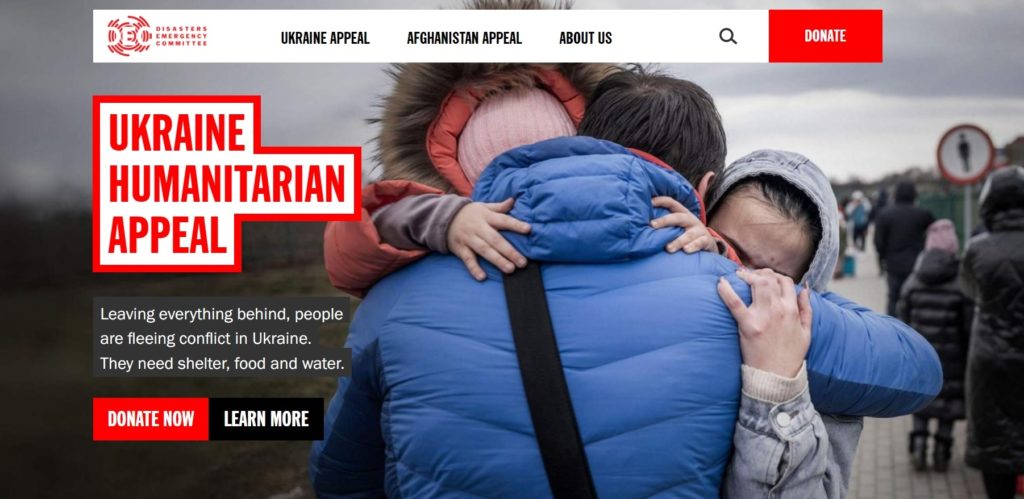
Action Against Hunger:
Action Against Hunger is an international charity committed to saving the lives of malnourished children and supporting their families to beat hunger It is currently reaching out to 46 countries, including the ongoing situation in Ukraine as well as events in Afghanistan, Syria and more.
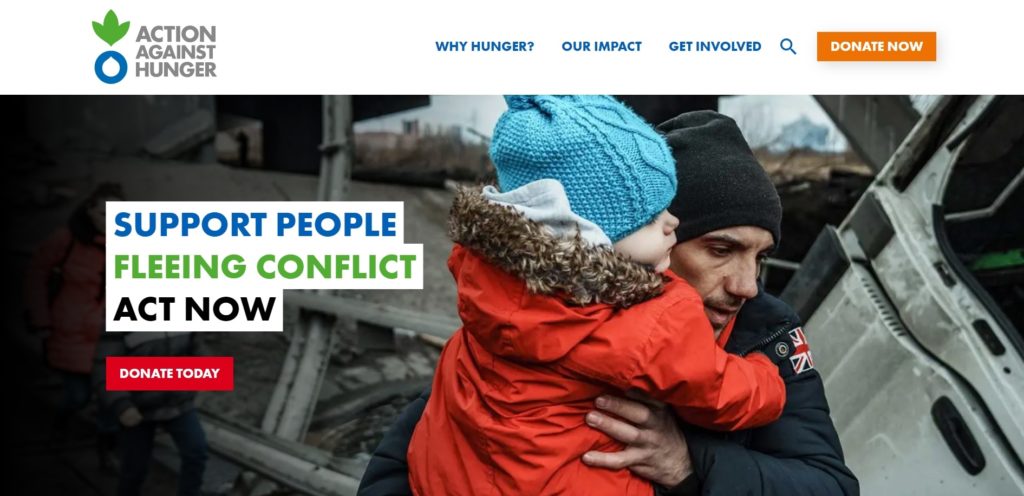
Action Aid:
Action Aid is an international charity that works with local women and girls to end violence, tackle poverty and fight for women’s economic rights. As women are more commonly more affected during disasters and emergencies (with violence against them also increasing), Action Aid looks to empower local women to lead the response.
Age International:
Age International (a subsidiary of Age UK) is here to make the world a better place for older people in some of the world’s poorest places. It seeks to reduce poverty and improve health, while promoting rights and responding to emergencies, including the conflict in Ukraine and the Covid-19 pandemic.
British Red Cross:
The British Red Cross, as part of the wider International Committee of the Red Cross (and further Red Crescent organisations), is a volunteer-led humanitarian organisation that helps people in crisis, bringing together a network or more than 4,000 staff and 21,000 volunteers. As well as its own UK emergency response efforts, it also unites with other Red Cross and Red Crescent societies around the world to prevent or ease human suffering. In times of conflict it helps refuges and asylum seekers as well as protecting people directly involved to save lives.
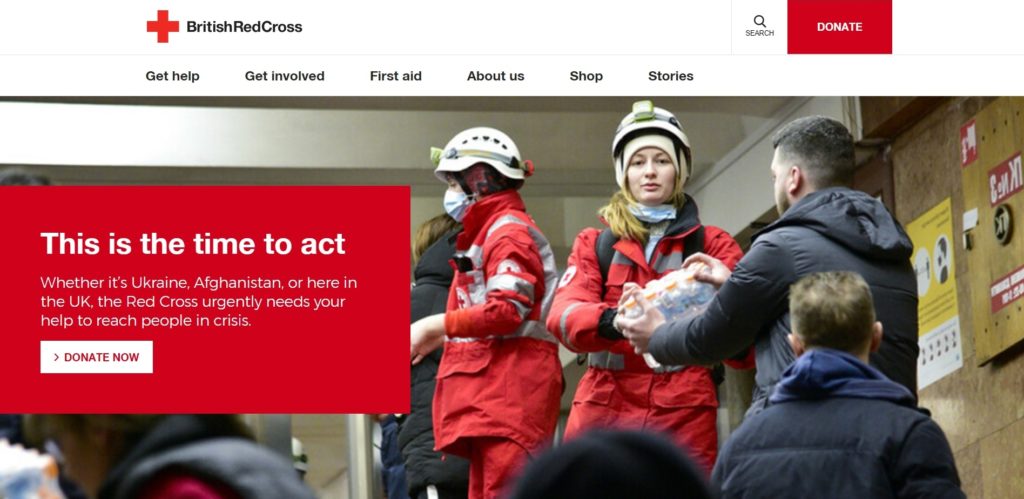
Catholic Agency for Overseas Development:
CAFOD is the official Catholic aid agency for England and Wales, bringing hope and compassion to poor communities to end poverty and injustice for people or all faiths and none.
Care International:
Founded in 1945 to provide ‘care’ packages to people recovering from war, Care International continues to fight against poverty by delivering humanitarian aid in the world’s poorest countries, with emergency response experts in more than 60 countries. It also focuses on empowering women and girls to help lead the change.
Christian Aid:
Christian Aid is a partnership of people, churches and local organisation with a vision to end poverty, supporting local people in poor countries to understand the causes of poverty and how to fight it. It uses its resources in countries affected by crisis situations to save lives and support people in the longer term.
Concern:
Concern Worldwide is an international humanitarian organisation that strives for a world free from poverty, fear and oppression. It delivers life-saving and life-changing interventions to some of the world’s poorest and most vulnerable people, including rapid emergence response.
International Rescue Committee:
Founded in 1933 at the call of Albert Einstein, the International Rescue Committee helps those whose lives and livelihoods have been shattered by conflict and disaster to survive, recover and rebuild. Today it works in more than 40 crisis-affected countries and conflict zones, as well as helping refugees integrate into new communities.
Islamic Relief:
As well as responding to disasters, Islamic Relief also promotes sustainable economic and social development by working with local communities – regardless of race, religion or gender. It has been responding to emergencies for more than 30 years, providing a lifeline for vulnerable communities affected by conflict and natural disasters, and has a presence in more than 40 countries around the world.
Oxfam:
Established in 1942, Oxfam is a global movement that fights the injustice of poverty. It seeks to save and rebuild lives in disasters and help people to build better lives for themselves and those around them. It also tackles issues such as inequality, discrimination against women and climate change.
Plan International:
Plan International is a global children’s charity that works to give every child the same chances in life. It works to ensure children in the world’s poorest communities have access to education, healthcare and clean water, and when disaster strikes it steps in to protect children and keep them safe, keep them learning and to help them recover.
Save the Children:
Working in the UK and around the world, Save the Children supports children to learn, grow and become who they want to be. When disaster strikes, it responds by delivering life-saving food, shelter and medicines where it’s urgently needed, and helps to keep children and their families safe and rebuild their lives.
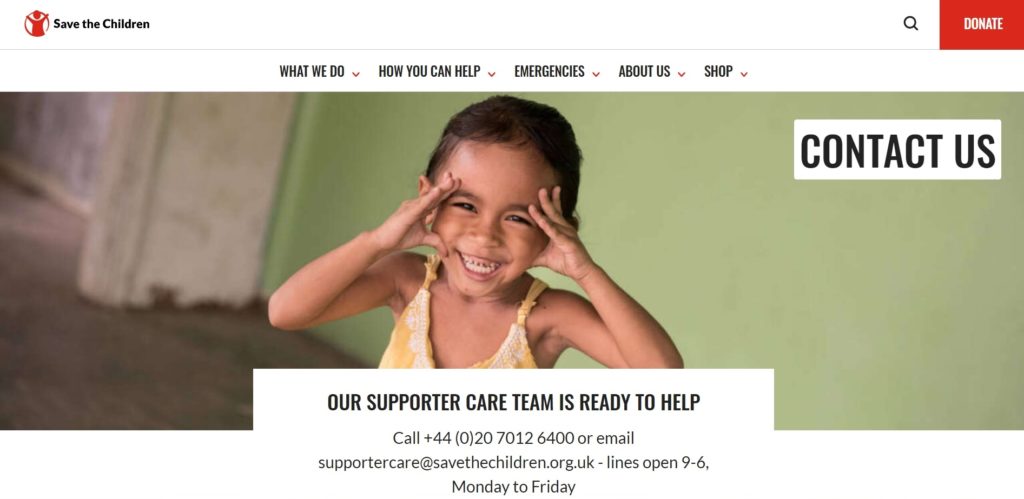
Tearfund:
Founded in 1968, Tearfund is a Christian charity that works with local churches and organisations in more than 50 countries to help communities tackle and escape the worst effects of poverty and disaster. It responds to disasters and conflicts, supporting those in greatest need through the recovery process.
World Vision:
World Vision in an international children’s charity that focuses on helping the most vulnerable children overcome poverty and experience fullness of life. It has more than 70 years’ experience and has worked in nearly 100 countries to bring positive change and when disaster strikes it can offer immediate support and help to rebuild lives.
————————————–
There are plenty of other great charities working outside of the DEC. These include War Child, a specialist charity for children affected by conflict that works to ensure a safe future for them through life-changing services and support in their communities. Médecins Sans Frontières, more commonly known as Doctors Without Borders, is an international humanitarian organisation working in more than 70 countries that sends medical teams to save lives in conflict zones, natural disasters and epidemics.
There are many more wonderful organisations doing great things to help those in need, and with a little patience and research you should be able to find at least one or two that align with your own interests. Wherever that may be, rest assured that any amount of support you can offer – be it financial, physical or emotional – will be greatly appreciated by those involved, and most notably by those who benefit from it.
